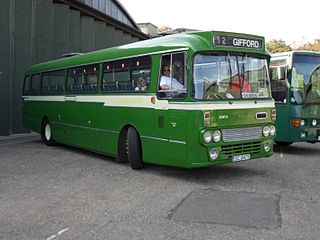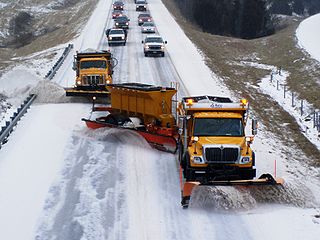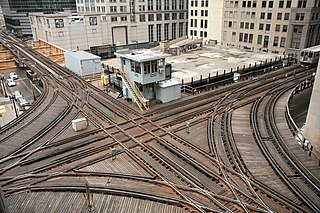
A road is a wide way leading from one place to another, especially one with a specially prepared surface which vehicles can use.

A filling station is a facility that sells fuel and engine lubricants for motor vehicles. The most common fuels sold in the 2010s were gasoline and diesel fuel. A typical filling station can also be known as a fueling station or gas station, gasoline stand or SS (Japan), petrol pump or petrol bunk, garage, petrol station, service station, servo (Australia), fuel station (Israel) or petroleum station (Rwanda).
Highways England Company Limited is the government-owned company charged with operating, maintaining and improving England's motorways and major A roads. It operates information services through the provision of on-road signage and its Traffic England website, provides traffic officers to deal with incidents on its network, and manages the delivery of improvement schemes to the network.

Eastern Scottish Omnibuses Ltd. was a bus and coach operator based in Edinburgh, Scotland and a subsidiary of the Scottish Bus Group. Eastern Scottish was formed in June 1985 from the main part of Scottish Omnibuses Ltd., which had itself traded as 'Eastern Scottish' since the 1960s. Following privatisation in 1990 the company traded as 'SMT' reviving the original name of the company. It operated until 1994, when it became part of GRT Bus Group plc.

A truck stop, known as a service station in the United Kingdom, and a travel center by major chains in the United States, is a commercial facility which provides refuelling, rest (parking), and often ready-made food and other services to motorists and truck drivers. Truck stops are usually located on or near a busy road.

A snowplow is a device intended for mounting on a vehicle, used for removing snow and ice from outdoor surfaces, typically those serving transportation purposes. Although this term is often used to refer to vehicles mounting such devices, more accurately they are known as winter service vehicles, especially in areas that regularly receive large amounts of snow every year, or in specific environments such as airfields. In other cases, pickup trucks and front end loaders are outfitted with attachments to fulfill this purpose. Some regions that do not frequently see snow may use graders to remove compacted snow and ice off the streets. Snowplows can also be mounted on rail cars or locomotives to clear railway tracks.

Snow removal or snow clearing is the job of removing snow after a snowfall to make travel easier and safer. This is done by both individual households and by governments and institutions.

The Autostrade are roads forming the Italian national system of motorways. The total length of the system is about 6,758 kilometres (4,199 mi). In North and Central Italy, the Autostrade mainly consists of tollways managed by Atlantia S.p.A., a holding company controlled by the Benetton family. Other operators include ASTM, ATP, and Autostrade Lombarde in the north-west; Autostrada del Brennero, A4 Holding, Concessioni Autostradali Venete, and Autovie Venete in the north-east; Strada dei Parchi, SALT, SAT, and Autocisa in the center; and CAS in the south.
Toronto Transportation Services, formerly Metro Roads and Works, is a division of the municipal government of Toronto. It is responsible for all municipally maintained roadways in Toronto, Ontario, Canada.

A winter service vehicle (WSV), or snow removal vehicle, is a vehicle specially designed or adapted to clear thoroughfares of ice and snow. Winter service vehicles are usually based on a dump truck chassis, with adaptations allowing them to carry specially designed snow removal equipment. Many authorities also use smaller vehicles on sidewalks, footpaths, and cycleways. Road maintenance agencies and contractors in temperate or polar areas often own several winter service vehicles, using them to keep the roads clear of snow and ice and safe for driving during winter. Airports use winter service vehicles to keep both aircraft surfaces, and runways and taxiways free of snow and ice, which, besides endangering aircraft takeoff and landing, can interfere with the aerodynamics of the craft.
Roadside assistance and breakdown coverage are services that assist motorists, or bicyclists, whose vehicles have suffered a mechanical failure that leaves the operator stranded.

Ribble Motor Services was a large regional bus operator in the North West England based in Preston.

Vehicle recovery is the recovery of any vehicle to another place, generally speaking with a commercial vehicle known as a recovery vehicle, tow truck or spectacle lift.
The Aldenham Works, or Aldenham Bus Overhaul Works, was the main London Transport bus overhaul works. It was located on the edge of the Hertfordshire village of Elstree and not in Aldenham. In its heyday, 50 buses a week were overhauled there, and it was the most comprehensive bus overhaul operation in the world. It opened in 1956 and closed in November 1986. The buildings were demolished in 1996.

Fountain Tire Holdings Ltd. is a Canadian tire dealer and automotive service provider with 160 consumer locations in Central and Western Canada. The company also provides tires and tire-related services to commercial truck fleets and off-road vehicles used in agriculture, oil and gas, mining and construction.

A Bahnbetriebswerk is the equivalent of a locomotive depot on the German and Austrian railways. It is an installation that carries out the maintenance, minor repairs, refuelling and cleaning of locomotives and other motive power. In addition it organises the deployment of locomotives and crews. In the Deutsche Bahn, a Bahnbetriebswerk is known today as a Betriebshof; the ÖBB refer to it as a Zugförderungsstelle (Zf). Many other countries simply use the term 'depot'. The smaller facility, the Lokomotivstation akin to the British sub-depot or stabling point, is affiliated to a Bahnbetriebswerk.

A Bahnbetriebswerk is a German railway depot where the maintenance of locomotives and other rolling stock is carried out. It is roughly equivalent to a locomotive shed, running shed or motive power depot. These were of great importance during the steam locomotive era to ensure the smooth running of locomotive-hauled services. Bahnbetriebswerke had a large number of facilities in order to be able to carry out their various maintenance tasks. As a result, they needed a lot of staff and were often the largest employers in the area.
Equipment rental, also called plant hire in some countries, is a service industry providing machinery, equipment and tools of all kinds and sizes for a limited period of time to final users, mainly to construction contractors but also to industry and individual consumers. Renting can be defined as getting equipment for a temporary purpose to help the people who are not willing to buy the equipment.

Departmental locomotives on the London Underground consist of vehicles of a number of types which are used for engineering purposes. These include battery locomotives, diesel locomotives, electric locomotives, sleet locomotives, pilot motor cars and ballast motor cars. Details of the first four types are covered elsewhere. Pilot motor cars and ballast motor cars are generally vehicles which have been withdrawn from passenger service, but continue to be used by the engineering department. Pilot motor cars are used to move other vehicles around the system, while ballast motor cars are used to haul ballast trains and engineering trains.

Hard infrastructure, also known as tangible or built infrastructure, is the physical infrastructure of roads, bridges, tunnels, railways, ports, and harbors, among others, as opposed to the soft infrastructure or "intangible infrastructure of human capital in the form of education, research, health and social services and "institutional infrastructure" in the form of legal, economic and social systems. This article delineates both the capital goods, or fixed assets, and the control systems, software required to operate, manage and monitor the systems, as well as any accessory buildings, plants, or vehicles that are an essential part of the system. Also included are fleets of vehicles operating according to schedules such as public transit buses and garbage collection, as well as basic energy or communications facilities that are not usually part of a physical network, such as oil refineries, radio, and television broadcasting facilities.
















